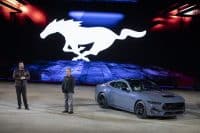 A number of things have happened to Chesapeake Energy (NYSE: CHK) since the disclosure that its CEO, Aubrey McClendon, took tens of millions of dollars of loans to invest side-by-side with his company in new wells. The first among them was that the board said it would take away his chairman’s role. That is the least important. The board also will have to drop him as CEO, and do so soon. Among the big questions the company faces is who will replace him.
A number of things have happened to Chesapeake Energy (NYSE: CHK) since the disclosure that its CEO, Aubrey McClendon, took tens of millions of dollars of loans to invest side-by-side with his company in new wells. The first among them was that the board said it would take away his chairman’s role. That is the least important. The board also will have to drop him as CEO, and do so soon. Among the big questions the company faces is who will replace him.
Carl Icahn has taken a stake in the company and has begun to press to add directors he supports to Chesapeake’s board. If the past is any indication, public corporations can resist this kind of pressure for a long time.
Chesapeake cannot avoid several other pressing issues. Reuters reports that the company will meet with its lenders this week. It needs to raise about $10 billion to offset a sharp drop in natural gas prices. Lenders rarely play a role in corporate governance, but they may believe that McClendon’s problems are a distraction during a period when management should have a strong focus on the company’s near-term future. Because of this, these lenders may quietly press Chesapeake’s board to pick a new CEO.
The board also has to consider how important it is for Chesapeake to stay independent. Its market cap has fallen enough that it is an attractive takeover target for energy companies that think its assets are worth more than the market values them, based on share price. The board might believe that an auction of the company is the best way out of its trouble. If not, the solution to the CEO problem is even more pressing.
None of Chesapeake’s directors is particularly qualified to run an energy company. The board has one U.S. Senator and a former governor of Oklahoma. Director Merrill A. Miller, Jr., the head of oilfield services firm National Oilwell Varco (NYSE: NOV), would be a candidate. But why would he leave a good job for a bad one?
The lack of candidates on the board leaves a few internal candidates. One fairly common practice when a CEO leaves suddenly is to temporarily appoint the CFO. In this case that is Domenic J. Dell’Osso, Jr. But there will be questions about the extent to which he knew about McClendon’s financial activities. Among operating management, the most likely candidate is Steven C. Dixon, Chesapeake’s executive vice president of Operations and Geosciences and chief operating officer. There is little reason to believe that an operating officer was directly involved in McClendon’s investments.
Chesapeake will have to replace McClendon soon. Dixon is the most logical candidate.
Douglas A. McIntyre
Are You Ahead, or Behind on Retirement? (sponsor)
If you’re one of the over 4 Million Americans set to retire this year, you may want to pay attention.
Finding a financial advisor who puts your interest first can be the difference between a rich retirement and barely getting by, and today it’s easier than ever. SmartAsset’s free tool matches you with up to three fiduciary financial advisors that serve your area in minutes. Each advisor has been carefully vetted, and must act in your best interests. Start your search now.
Don’t waste another minute; get started right here and help your retirement dreams become a retirement reality.
Thank you for reading! Have some feedback for us?
Contact the 24/7 Wall St. editorial team.





